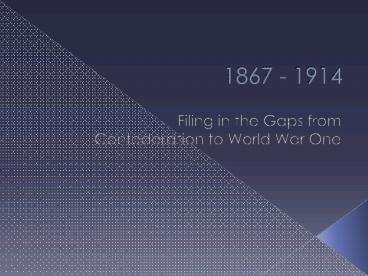Filing in the Gaps from - PowerPoint PPT Presentation
1 / 18
Title:
Filing in the Gaps from
Description:
define: an original fundamental and authoritative document ... this was also the second, third, fourth and fifth thing to do ' ... Head Gear. Strange ... – PowerPoint PPT presentation
Number of Views:38
Avg rating:3.0/5.0
Title: Filing in the Gaps from
1
1867 - 1914
- Filing in the Gaps from
- Confederation to World War One
2
First things first!
Primary Sources define an original fundamental
and authoritative document pertaining to an event
or subject of inquiry a firsthand or eyewitness
account of an event (ex. autobiography) Secondar
y Sources define any document that describes an
event, person, place, or thing (ex. biography)
3
Canada from 1867 - 1905
Characteristics of the country (1867) - small
population not geographically dispersed -
American Growth is influencing Canada through
canal building - Western settlement is driven by
Hunting (furs and buffalo) and isolated gold
rushes (Fraser River)
Characteristics of the country (1905) - Larger
and more dispersed country reaching from sea to
sea - Rail ways have become the dominant force
in transport - American growth west has put
pressure on Canada to populate the prairies to
ensure its sovereignty - Canadian economy is more
developed and its cities need the mineral and
agricultural goods of the west
4
Wilfrid Laurier
Canada has been modest in its history, although
its history, in my estimation, is only
commencing. It is commencing in this century. The
nineteenth century was the century of the United
States. I think we can claim that Canada will
fill the twentieth century." -- Sir Wilfrid
Laurier, January 18, 1904 --
5
British Imperialism 1900s
6
Canadas International Status
- Canada was officially given independence in 1867
through the British North America Act - While Canada was independent in some ways it was
still dependant on Britain. - The Dominion of Canada is subservient to Britain
on issues of Foreign Policy - Most people are also very loyal to their British
roots
7
Boer War 1899-1902
- Dutch East India Company sent farmers (Boers) to
South Africa in 1652 - The war in South Africa was a contest between
British imperialism and Boer nationalism - 1795 British arrived
- 1836 Boers go inland to gain freedom and form
republics Orange Free State and Transvaal. - 1886 Boers discover diamonds and gold
- Uitlanders or foreigers attempt to take over
8
Canada the Boer War
- Laurier sent volunteers (7400 men and 16 nurses
sent) - Split Canada
- French This is not our war
- British We must protect MOM
- Lauriers volunteers didnt satisfy either side
9
Alaska Boundary Dispute
- 1867 Americans bought Alaska from Russia for 7
million - 2 cents/acre.
- 1898 - Yukon gold rush vague borders now became
a concern - Both Canada and U.S. wanted coastal access
10
1898 - AlaskanBoundary Dispute
- 1901British agreed to help arbitrate the dispute
- 3 Americans, 2 Canadians,1 British.
- President Teddy Roosevelt talks secretly to
Brits. - They dont assert sovereignty in north...
11
Ouch!Dispute Settled 1903
- British awarded panhandle to U.S.
- Canada shocked, after having helped Britain in
the Boer War. - Britain cozy with U.S. over its own interests
Arms race and resources. - Loyalty? Betrayal?
12
Immigration
- 1896 - Clifford Sifton Minister of Interior
- Advertised for Immigrants in Europe 160 acres of
free land
The first thing to do was to settle the empty
West with producing farmers this was also the
second, third, fourth and fifth thing to do
Canada is a national entity. Canada is an
organism, and you cannot develop a single part of
an organism satisfactory. Each and all parts
must contribute to the vitality of the whole.
-- Sifton--
13
We need people of the right kind into the West .
- Who do you think would be the favoured?
Pat, Tobe, and Mike or
George P. Chutskoff
14
When I speak of quality...I think a stalwart
peasant in a sheepskin coat, born to the soil,
whose forefathers have been farmers for 10
generations, with a stout wife and a half-dozen
children, is good quality
Sifton favoured those that had an economic
advantage to help grow and build the country, the
Ukrainian, Russian, and the Dutch
15
How do you think these immigrants were treated?
Different Head Gear
How do we treat them today?
Strange Dress
16
Nativism
- While Sifton was very much a proponent of these
immigrants they were not always welcomed by the
CANADIAN PEOPLE - People felt that the were changing the culture of
the country
Define the policy of protecting the interests of
native inhabitants against those of immigrants
17
These people were different
- They didnt speak English
- They werent protestant
- They Lived communally
- They didnt use currency
- They dressed funny
THEY WERE BEING PROSPEROUS AND SOME CANADIANS
WERE NOT THE NATIVES GOT JEALOUS
18
What Happened Next?
- Clifford Sifton left and Frank Oliver became the
Minister of the Interior - Oliver Changed the immigration act to exclude non
Canadian Groups - He also gave away the land of the Mennonite and
Doukhobor People































